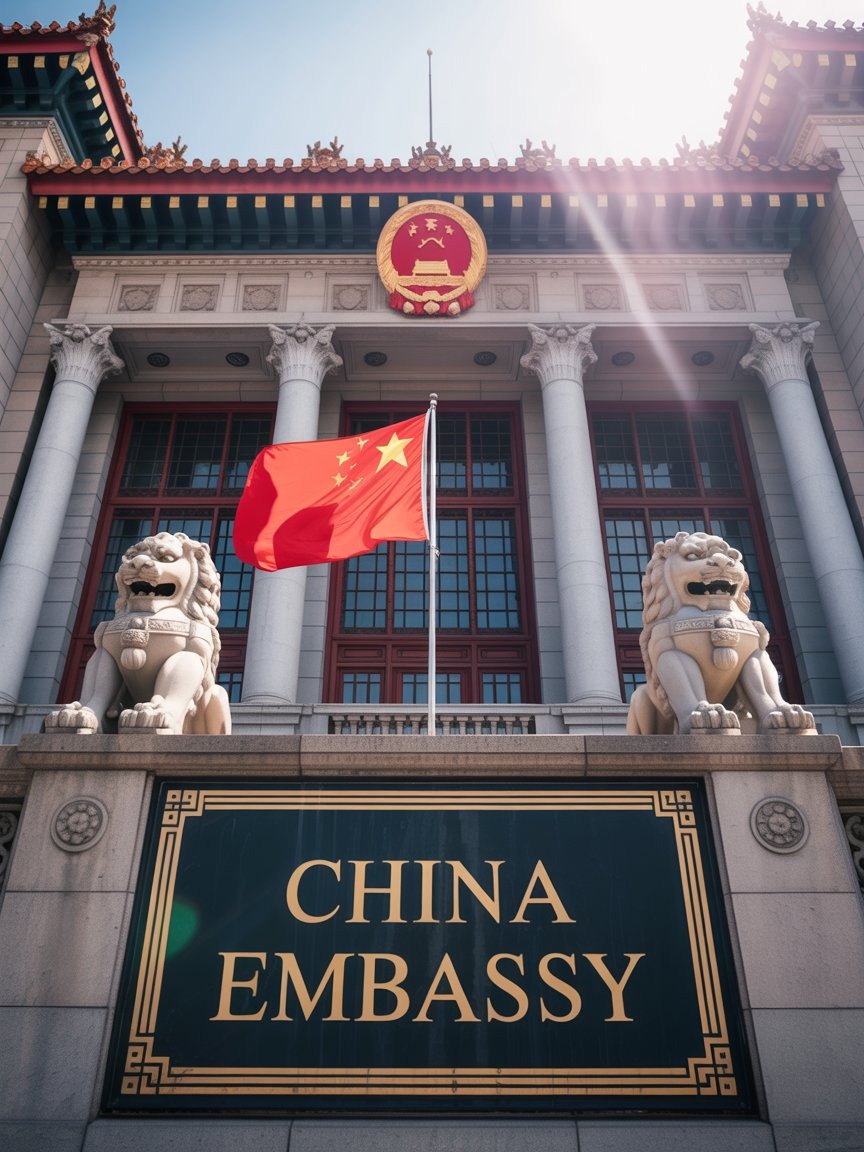Legalize Your Indian Certificates for China in 2025 "legalize certificates for china"
Discover the step-by-step process to legalize your Indian certificates for China in 2025. Ensure your documents meet all requirements for smooth acceptance and avoid any legal hassles. "legalize certificates for china"
10/15/20257 min read


Introduction to Certificate Legalization
Certificate legalization is a crucial process for individuals aiming to utilize their Indian academic and professional qualifications in China. Given the growing trend of global mobility, the demand for the legal recognition of foreign credentials is becoming increasingly important. As countries like China attract a diverse pool of talent from around the world, the need for Indian nationals to ensure their qualifications are recognized cannot be overstated.
In essence, certificate legalization involves a series of administrative procedures that authenticate the validity of educational documents, such as degrees, diplomas, and professional certificates. This process is essential for those looking to secure employment, pursue further education, or apply for residency in China. Without proper legalization, even well-earned qualifications may be deemed invalid, which can have adverse effects on an individual’s career opportunities abroad.
The legalization process serves to not only validate the authenticity of the certificates but also to verify that they meet the specific requirements set forth by the Chinese government. This includes ensuring that the issuing institutions are recognized and that the qualifications conform to the educational standards in China. Increasing international collaborations and cross-border academic exchanges further underline the necessity of having one’s certifications officially recognized.
For Indian expatriates or students aspiring to establish themselves in China, understanding the implications of certificate legalization is a fundamental step. It empowers them to navigate administrative regulations effectively, thereby easing their transition into the Chinese professional and educational landscape. As we delve deeper into the nuances of this process, it becomes clear that proper certificate legalization is essential for any individual wishing to leverage their qualifications in foreign environments.
Understanding the Legalization Process
The legalization of Indian certificates for use in China is a crucial step for anyone looking to work, study, or reside in the country. Legalization is essentially the process through which a document is verified, ensuring it meets the legal requirements set by the destination country. This process is necessary because Chinese authorities require verification of foreign documents to combat fraud and ensure authenticity.
The legalization process typically comprises several steps. Initially, the document must be authenticated by a competent authority in India, such as the Ministry of External Affairs (MEA). This involves the submission of original documents along with the requisite attestation fees. After this step, the documents are forwarded to the Chinese embassy or consulate for further verification. This dual-layer authentication serves to reinforce the credibility of the documents being submitted.
Documents that generally require legalization include academic certificates, marriage certificates, and other official documents. Each type of document may have specific requirements and may entail different processing times, depending on the authorities involved. It is essential to check the exact requirements for each document type, as this can vary based on one's situation.
In addition to the MEA, other authorities may be involved in the legalization process. These could include notaries, state-level education boards, and other governmental departments. The role of these entities is to validate the documents before they move to the consular level. Properly navigating this multi-step process can appear daunting; however, understanding the requirements and procedures can significantly streamline the legalization of Indian certificates for China in 2025.
Necessary Documents for Legalization
In order to successfully legalize Indian certificates for use in China, it is essential to gather a comprehensive set of documents. The process requires various forms of paperwork, primarily categorized into educational certificates, professional documents, identification proofs, and additional items that may be specified depending on one’s specific situation.
Firstly, educational certificates are fundamental to the legalization process. This includes degrees, diplomas, and transcripts from recognized educational institutions. Each educational document should be attested by the relevant authorities, such as the Ministry of Education in India, ensuring authenticity and acceptance in China. Depending on the level of education, it may be necessary to include both undergraduate and postgraduate documents.
Next, professional documents should be adequately prepared. This may involve degrees or certificates confirming professional qualifications, along with any licenses or registrations if applicable. For professionals seeking employment in China, proof of previous work experience, such as experience letters endorsed by former employers, may also be required to support their credentials.
Additionally, identification proofs are necessary. This primarily includes a valid passport, which serves as the main identification document. Some individuals may also need to present residency permits or national identity cards, depending on their circumstances.
Furthermore, individuals might need to provide extra paperwork like notarized copies of the aforementioned documents, a legalization application form specifically for China, and a completed checklist provided by the embassy or consulate. It is advisable to consult the relevant Chinese diplomatic mission for any specific instructions or additional documentation that may enhance the legality of the submitted papers.
In summary, ensuring that all required documents are carefully prepared and verified is crucial for the successful legalization of Indian certificates for China in 2025.
Step-by-Step Guide to Legalization in 2025
Legalizing your Indian certificates for use in China is a critical process that requires careful attention to detail. To ensure a successful legalization in 2025, follow this comprehensive guide, which outlines the necessary steps, timelines, and additional services that may be beneficial.
The first step involves identifying the types of certificates that need legalization. These often include educational degrees, marriage certificates, and other official documents. Once you have your documents ready, it is essential to have them notarized. Notarization serves as a preliminary confirmation of the document’s authenticity and should be done by a certified notary public in India. This procedure usually takes around one week, depending on the notary’s schedule.
After notarization, the next step is to approach the relevant state authority for legalization. Each state may have its own requirements and processing times. Typically, this stage can take from two to four weeks, so it's advisable to submit your documents early. Ensure that the authorities have all the necessary information, including identification and proof of residency.
Once state legalization is completed, the documents must be sent to the Embassy or Consulate of China for final legalization. Prepare for this step by checking if your documents require translation into Mandarin or if additional certifications are necessary. Utilizing a professional translation service can expedite this process, as accurate translations are crucial for acceptance in China. This phase might take an additional two to four weeks, so be mindful of the timeline.
Finally, once your documents are fully legalized, be sure to make copies and keep the originals safe. Thorough preparation and patience will facilitate a smoother experience during the legalization of your Indian certificates for China in 2025. Following these steps diligently will help you avoid unnecessary delays.
Common Challenges and Solutions
Legalizing Indian certificates for use in China can be a complex process fraught with various challenges. One of the most significant obstacles encountered is delays in processing times. These delays can arise from numerous factors, including bureaucratic inefficiencies, high volumes of applications, or incomplete documentation. To mitigate this, it is advisable to initiate the legalization process well in advance of any deadlines. Having a complete understanding of the required documents and ensuring they are accurately prepared can significantly reduce the potential for delays.
Another common issue involves document rejections. Such rejections often occur due to non-compliance with specific requirements set forth by Chinese authorities. To avoid this pitfall, it is crucial to conduct thorough research on the latest requirements for document legalization. Engaging with a professional legalization service can prove beneficial, as they typically have updated knowledge of the documentation standards and can ensure that all necessary authentication steps are completed correctly.
Misunderstandings with local authorities also represent a considerable challenge. Language barriers and differing legal terminologies can lead to confusion during the verification process. One effective solution is to employ the assistance of a reliable intermediary or consultant who understands both the Indian and Chinese legal systems. This approach can help bridge communication gaps, ensuring that the process runs more smoothly and reducing the likelihood of miscommunication.
In navigating these challenges, thorough preparation and informed assistance are critical. By anticipating potential obstacles and seeking appropriate support, individuals can enhance their chances of successfully legalizing their Indian certificates for use in China, streamlining the entire process and minimizing stress.
Post-Legalization: What You Need to Know
Once you have successfully legalized your Indian certificates for use in China, there are several important considerations to keep in mind. Understanding how to effectively utilize these legal documents will facilitate your transition in various domains, including employment opportunities, education, and compliance with residency regulations.
First and foremost, it is crucial to be aware of how to present your legalized documents. When applying for jobs in China, most employers will require these official documents to verify your qualifications. Ensure that you have copies of your legalized certificates readily accessible—both physical and digital versions can be beneficial. This will aid in expediting the recruitment process and enhance your credibility as a candidate.
In addition to job applications, enrollment in educational institutions will also necessitate the presentation of your legalized documents. Whether you are pursuing higher education or vocational training, universities and colleges in China typically require proof of your academic achievements. Be prepared to provide originals along with authenticated translations, if applicable, to satisfy enrollment criteria.
Complying with residency requirements is another vital aspect of navigating life in China post-legalization. Foreigners intending to stay in the country for extended periods must obtain the appropriate visa or residence permit, which typically requires evidence of employment or enrollment in an educational institution. Familiarize yourself with local immigration regulations to ensure you meet all necessary requirements, which may include obtaining a health checkup or securing a sponsor.
As you navigate these processes, it is advisable to seek assistance from professionals who are well-versed in legal and immigration matters in China. This proactive approach will help to avoid potential pitfalls and ensure your integration into Chinese society is as smooth as possible.
Conclusion and Final Tips
Legalizing Indian certificates for use in China can initially seem like a daunting process, but understanding the essential steps can pave the way for a smoother experience. Throughout this blog post, we have discussed the various stages involved, including the importance of having your documents attested by the Ministry of External Affairs (MEA) and subsequently by the Chinese embassy or consulate. Each step carries significance and requires careful attention to detail to comply with both Indian and Chinese regulations.
To ensure a successful legalization process, it is vital to stay informed about any changes in the documentation requirements or procedures. Government policies can frequently evolve, especially in response to geopolitical factors or shifts in international relations. Regularly checking the official websites of the MEA and the Chinese embassy will keep you abreast of any updates pertinent to your application. Additionally, consider reaching out to professional services or consultants who specialize in document attestation; they can offer valuable insights and assistance.
Another critical consideration is to double-check your documents for accuracy and legitimacy. Ensure that all necessary paperwork is complete, including translations, if required, and verify that your certificates are in order before submission. Having all your documentation properly organized can prevent delays and facilitate a smoother legalization process.
Finally, approach the entire legalization process with confidence. By being well-prepared and informed, you can navigate the requirements and avoid common pitfalls. Legalizing your Indian certificates not only helps you comply with international standards but also opens up opportunities, whether for employment, education, or personal endeavors in China. Remember to take proactive steps and stay engaged with the process for the best results.
